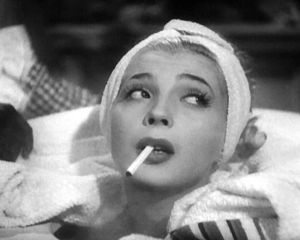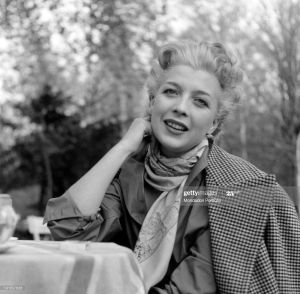Artist
 Isa Barzizza, actress and dubber, was born in Sanremo on 22 November 1929.
Isa Barzizza, actress and dubber, was born in Sanremo on 22 November 1929.
She made her debut at a very young age in the theatre, first with the company of Ruggero Ruggeri and then with that of the De Filippo brothers.
Daughter of the composer and conductor Pippo Barzizza, after the First World War she was one of the most beloved showgirls of the magazine theatre, star of the shows signed Erminio Macario or Remigio Paone, great impresario and discoverer of talents.
During this period, she worked with many illustrious stage actors, alongside whom she often found herself on the big screen.
Like Totò, who accompanied his film debut in "I due orfanelli" (Mario Mattoli, 1947).
The other orphan is Carlo Campanini, unforgettable jealous husband (and tricked by the false eunuch Totò) in "Un turco napoletano" (Mario Mattoli, 1953).
Blonde, refined and witty, she also enjoyed immediate success as a film actress and contended for public sympathy with Silvana Pampanini. When Loren is still Sofia Lazzaro and makes an appearance in "Milan billionaire" (1951) or "Era lui sì!...sì!" (1951) (both by Marchesi and Metz), she is the undisputed female protagonist, respectively wife of the 'cavalier' Tino Scotti or in love with Walter Chiari.
When Loren is still Sofia Lazzaro and makes an appearance in "Milan billionaire" (1951) or "Era lui sì!...sì!" (1951) (both by Marchesi and Metz), she is the undisputed female protagonist, respectively wife of the 'cavalier' Tino Scotti or in love with Walter Chiari.
After having been a kleptomaniac in "Botta e risposta" (Mario Soldati, 1950), in 1952 she introduced herself as a thief in that mythical compartment of "Totò in colour" (Steno), while she was collecting, one after the other, many films together with him.
Married to director Carlo Alberto Chiesa, in the early 1950s she also measured herself on stage with a text by Shakespeare, "La dodicesima notte", directed by Renato Castellani and baptized one of the first examples of television prose by reciting Goldoni's one-act play "L'osteria della posta" (Franco Enriquez, 1954). Not yet thirty years old, she moved away from the world of show business and later became a dubbing director.
Not yet thirty years old, she moved away from the world of show business and later became a dubbing director.
After almost twenty years of absence, she returned to the cinema thanks to Ettore Scola who, in "C'eravamo tanto amati" (1974), made her the 'mistress' of the pension where Luciana-Stefania Sandrelli attempted suicide.
She continues to appear sporadically on the screen, perhaps around Totò ("Grazie al cielo c'è Totò", Stefano Pomilia, 1990).
In 2012, in the film "Viva l'Italia" she returned to the big screen playing the role of Marisa, an elderly woman in hospital.
(edited by Marco Mauro; Fonte la Repubblica)




